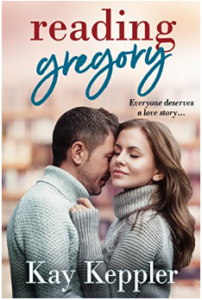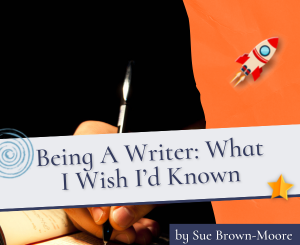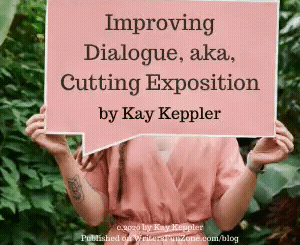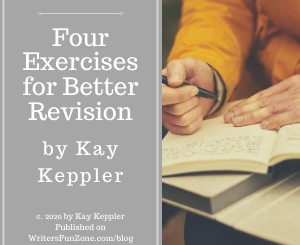Revise Your Way to Success by Kay Keppler
 Let’s welcome back monthly columnist, editor, and novelist, Kay Keppler, as she shares with us “Revise Your Way to Success.” Enjoy!
Let’s welcome back monthly columnist, editor, and novelist, Kay Keppler, as she shares with us “Revise Your Way to Success.” Enjoy!
***
Any literary effort is only as good as your editor can make it. No matter how sparkling you think your words are as you type them for the first time (or the second time, or even the third time), they really aren’t. That’s just how it works. First drafts are clunky, awkward, and unfocused. Depending on your style, they will be either overwritten or insufficiently fleshed out. Your themes and motifs will be absent, your plot unformed, and your characters underdeveloped.
Revise and Delete
You need an editor to make your writing shine, and the first red pen that touches your draft should be your own. Learn how to revise, and especially, learn how to delete. Read Strunk & White’s Elements of Style or some other book that shows you how to strip verbiage, and then apply what you’ve learned to your manuscript.
Being critical of your own work is a skill that’s difficult to acquire, because you have to believe in your story and your ability to tell it. It seems counterintuitive to look for flaws in your manuscript, but it isn’t. Think of revising as gardening. When an arborist looks at a tree, he has to cut back all the suckers to let the strong branches bloom. You must do the same.
Be Brutal
The first rule is, be brutal, because if you can’t take a strong line with your own work, someone else will. If you read a passage and you think something might be wrong with it, something definitely is wrong with it. And while you might be able to figure that out and fix it, you’re probably better off cutting it. Stephen King said about revising: “Get rid of every ounce of excess fat…. Revising a story to the bare essentials is always a little like murdering children, but it must be done.”
Revise until There’s Nothing Left to Fix
When I was a magazine editor, we had five days to edit an article before we moved the piece to typesetting. Our edit process went like this: On day 1, we did our first pass on the raw piece. This was a “strong” edit, and depending on the author, usually showed many changes.
On day 2, we did the second pass. This pass still required major effort. Day 3 required less work, and day 4, even less work, usually just catching missed commas, and simple stuff like that. By day 5, our goal was to see nothing left to fix, and we’d send it off to production.
You don’t need to try this process for your novel, but you absolutely should revise it until there’s nothing left to fix. For every sentence, every paragraph, and every chapter, ask yourself: Is this the best word I can find? Is my meaning clear? Is it grammatical? Can I cut a word, phrase, sentence, paragraph—even a chapter—without sacrificing anything essential? If you can’t look at your book and say with a clear conscience that you can’t improve it anymore; it’s as tight as you can make it, you’re not done yet.
Wanted: Sharp Eyes
When you revise, read critically. Ask yourself:
- Did you meet the objectives of your story?
- Did you establish your theme and motifs, resolve character conflicts, wrap up all your plot points, and conclude with a memorable ending?
- Does every scene move the story forward?
- If any scene introduces a new idea, action, subplot, or character, did you follow those threads through all the way to the end?
- Do your plot and characters arc?
- Did you correct or delete spelling and typing errors, awkward sentences, vague or unrealistic dialogue, florid descriptions, and places that just don’t read right?
If you can’t answer “yes” to any of these questions, go back to your manuscript and take another pass at it.
Kill Your Darlings
You have to be willing to cut the stuff you love if it serves no real purpose to your story. As Colette once said, “Put down everything that comes into your head, and then you’re a writer. But an author is one who can judge his own stuff’s worth, without pity, and destroy most of it.”
Readers won’t complain if a story is “too short,” but they absolutely will complain if it’s “too long,” because that means that they weren’t fully engaged. That doesn’t have to happen. Stick to the essentials and leave out everything else. You’ll have a book no one will want to put down.
***
ABOUT THE AUTHOR
Kay Keppler is an author Zero Gravity Outcasts, Betting on Hope, Gargoyle: Three Enchanting Romance Novellas, and editor of fiction and nonfiction –Angel’s Kiss and Outsource It!
is an author Zero Gravity Outcasts, Betting on Hope, Gargoyle: Three Enchanting Romance Novellas, and editor of fiction and nonfiction –Angel’s Kiss and Outsource It!
She lives in northern California. Contact her here at Writer’s Fun Zone in the comments below, or at kaykeppler@yahoo.com to ask questions, suggest topics, or if you prefer, complain.






